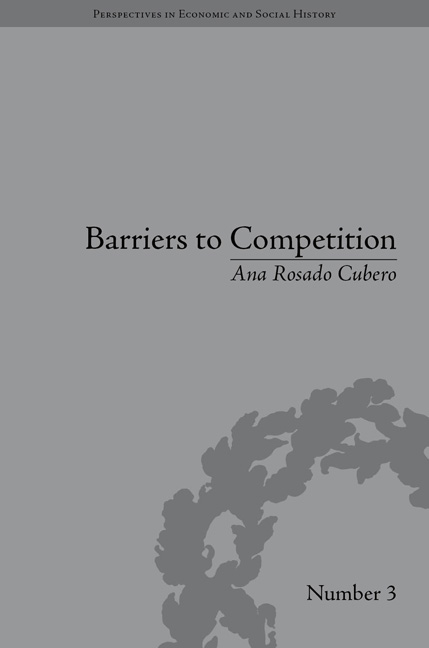Book contents
- Frontmatter
- CONTENTS
- Dedication
- Acknowledgements
- Introduction
- 1 Imperfect Competition in Economic Theory Before 1956
- 2 Barriers to Entry: the Late 1950s and the 1960s
- 3 The Harvard and Chicago Schools: Two Ways of Studying Barriers to Entry
- 4 Barriers to Entry in the 1970s
- 5 Barriers to Entry in the 1980s
- 6 Barriers to Entry: Current Analysis
- Conclusion
- Appendix: Tables
- Notes
- Works Cited
- Index
1 - Imperfect Competition in Economic Theory Before 1956
- Frontmatter
- CONTENTS
- Dedication
- Acknowledgements
- Introduction
- 1 Imperfect Competition in Economic Theory Before 1956
- 2 Barriers to Entry: the Late 1950s and the 1960s
- 3 The Harvard and Chicago Schools: Two Ways of Studying Barriers to Entry
- 4 Barriers to Entry in the 1970s
- 5 Barriers to Entry in the 1980s
- 6 Barriers to Entry: Current Analysis
- Conclusion
- Appendix: Tables
- Notes
- Works Cited
- Index
Summary
The Sherman Law has been in force in United States since 1890, and President Wilson signed the Federal Trade Commission into law in 1914. Both are the origin of controversy over the intervention of the government in the traditional laissez faire prevailing in America's industrial development. This chapter intends to achieve a big goal: to illustrate the debate between the academics who believe in the benevolence of the free market against academics who believe in the market power exercised by a big company. As they fight to survive nowadays, we are faced with one of the most important debates in the field of economic theory. Most of this book is about how academia has been able to develop worthwhile economic tools for the courts since 1956; the Guidelines should be considered as the legal framework within the courts’ decisions can be taken based on economic theory. In this chapter we intend to discuss only the origins of the issue, marked from 1890, the date of the Sherman Law, until 1956 – the date when what could be considered the first economic book full of economic tools – Barriers to Competition emerged. Bain's book is a deliberate attempt to control trusts in the United States, through economic framework and empirically-supported arguments. Academics who believed in the exercise of market power by trust found in Bain's book the scientific support they needed. The bad behaviour of a firm within an industry, mainly against rivals within a market it considers its own, began to be taken into account in economic theory as a result of the book's publication.
- Type
- Chapter
- Information
- Barriers to CompetitionThe Evolution of the Debate, pp. 17 - 46Publisher: Pickering & ChattoFirst published in: 2014

